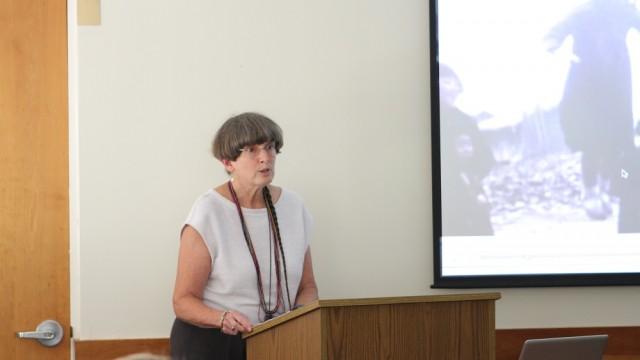The demilitarized zone, or DMZ, is the 150 mile area that divides two nations in conflict: North and South Korea. Lynch School of Education professor Brinton Lykes, along with 29 other women, ventured to the DMZ to help the country deal with the repercussions of the Korean War. On Wednesday, she spoke about her experience in the faculty lounge in Campion Hall.
After returning to the States in June, Lykes testified at a congressional hearing. Lykes insists the women she traveled with share their story so more people can be educated about the DMZ, the Korean War, and the conflict between North and South Korea.
“We need to think creatively about how to pay attention to what people in the local community think might be the most helpful,” Lykes said.
Lykes’ career as an activist has taken her to several countries struggling with armed conflict, including South Africa, Guatemala, and Northern Ireland. She has more experience in justice-seeking situations than in situations that involve reconciliation, she said.
“I’ve been very interested in armed conflicts and what its effects are on communities and on women and children in particular,” she said.
Ramsey Liem, a retired psychology professor, introduced Lykes to a group of women who were interested in crossing the DMZ. This group consisted of 30 women from 15 different countries, several of whom were Korean-American. Some of the Korean-Americans brought the ashes of their parents who had been born in North Korea as a gesture of reunification with their families.
“It was a very moving experience to talk to them about that and to hear from them the communications that they were in with people in the North in order to try to make that happen,” Lykes said.
The 30 women had three objectives for this journey: call attention to the un-ended Korean War, push for the reunification of families, and call attention to the 20th anniversary of the adoption of the U.N. resolution, which stated that women should be involved in all peace-making processes.
The group attended a peace symposium in which several people spoke about their experiences. Lykes specifically remembered one woman who had lost both of her arms during the Korean War. The woman had named both of her children using a Korean phrase: one translated to “I want revenge,” and the other to “I will take revenge in the next generation.”
“It gave me a lot to think about in terms of why it might be that she finds herself with so little opportunity to re-story her life in a more hopeful way,” Lykes said.
Lykes intends to continue her work in support of the North and South Korean women, who continue to struggle through this conflict, hoping for reunification.
“It’s not about us, it’s about them,” she said.
Featured Image by Kathleen Mikkelsen / Heights Staff







